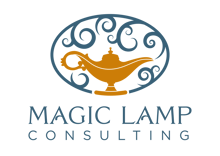Grant funding can be a game-changer for nonprofits looking to expand their impact and sustain their...
Understanding Your Reporting Obligations as a Nonprofit

As a nonprofit leader, you are driven by a passion for your cause and a commitment to making a positive impact on the world. However, amidst the daily hustle of running your organization and driving change, it's crucial not to overlook your reporting obligations. While these may seem like tedious administrative tasks, they are essential for maintaining transparency, accountability, and compliance within your organization. In this blog, the Magic Lamp Consulting team explains the significance of reporting obligations for nonprofits and provides guidance on how to navigate them effectively.
Why Reporting Obligations Matter
Reporting obligations serve several critical purposes for nonprofits:
- Transparency: Reporting allows nonprofits to be transparent about their activities, finances, and impact. This transparency builds trust with donors, stakeholders, and the general public, fostering stronger relationships and support for the organization's mission.
- Accountability: By reporting on finances, governance, and program outcomes, nonprofits hold themselves accountable to their stakeholders. This accountability ensures that resources are being used effectively and in line with the organization's mission.
- Compliance: Nonprofits are subject to various legal and regulatory requirements, depending on their jurisdiction and tax-exempt status. Meeting reporting obligations ensures compliance with these laws and regulations, avoiding potential penalties or loss of tax-exempt status.
Key Reporting Obligations for Nonprofits
While reporting requirements can vary based on factors such as organizational structure, size, and activities, there are several common obligations that most nonprofits must fulfill:
- Financial Reporting: Nonprofits are typically required to prepare and submit financial statements, including an annual report and IRS Form 990 (or its equivalent). These documents provide an overview of the organization's financial health, sources of revenue, expenses, and how funds are being allocated to support its mission.
- Governance Reporting: Nonprofits should report on their governance structure, including board composition, key policies (e.g., conflict of interest policy), and board meeting minutes. This helps demonstrate effective oversight and decision-making processes within the organization.
- Programmatic Reporting: Nonprofits must report on the impact of their programs and activities, outlining objectives, outcomes, and measures of success. This information helps donors and stakeholders understand the effectiveness of the organization's interventions and how they contribute to its mission.
- Compliance Reporting: Nonprofits must comply with various legal and regulatory requirements, such as filing annual reports with government agencies, maintaining tax-exempt status, and adhering to applicable laws governing areas such as employment, fundraising, and data protection.
Tips for Navigating Reporting Obligations
Navigating reporting obligations can seem daunting, but with careful planning and attention to detail, nonprofit leaders can streamline the process and ensure compliance:
- Stay Informed: Keep abreast of relevant laws, regulations, and reporting requirements applicable to your nonprofit. This may involve consulting legal counsel, attending training sessions, or accessing resources provided by regulatory agencies.
- Establish Processes: Develop robust internal processes for collecting, documenting, and reporting information required for various obligations. Assign clear responsibilities to staff or volunteers, and establish timelines to ensure timely submission of reports.
- Maintain Accurate Records: Keep detailed records of financial transactions, board meetings, program activities, and other relevant information. This not only facilitates reporting but also provides a historical record that can be valuable for internal decision-making and external audits.
- Utilize Technology: Leverage technology tools such as accounting software, donor management systems, and reporting platforms to streamline data collection, analysis, and reporting. These tools can help automate repetitive tasks and ensure accuracy in reporting.
- Seek Professional Assistance: If you're unsure about how to fulfill certain reporting obligations or need assistance with complex financial or legal matters, don't hesitate to seek help from professionals such as accountants, lawyers, or consultants with expertise in nonprofit compliance.
- Communicate Effectively: Use reporting as an opportunity to communicate with your stakeholders about your organization's achievements, challenges, and plans for the future. Craft clear, concise reports that highlight your impact and demonstrate accountability.



